book 6 unit 5 garmmar item the -ing form
文档属性
| 名称 | book 6 unit 5 garmmar item the -ing form |
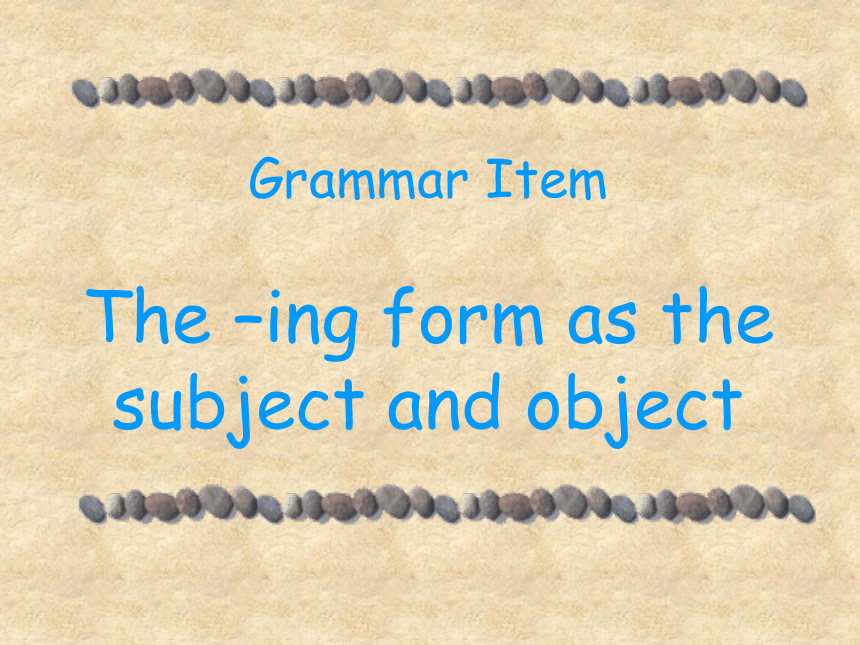
|
|
| 格式 | rar | ||
| 文件大小 | 320.2KB | ||
| 资源类型 | 教案 | ||
| 版本资源 | 人教版(新课程标准) | ||
| 科目 | 英语 | ||
| 更新时间 | 2008-04-23 00:00:00 | ||
图片预览

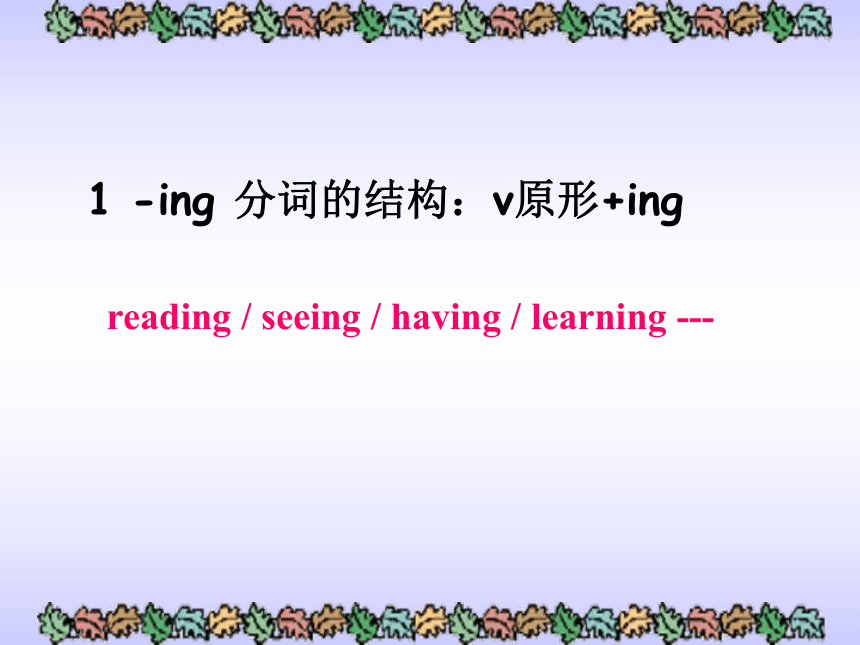
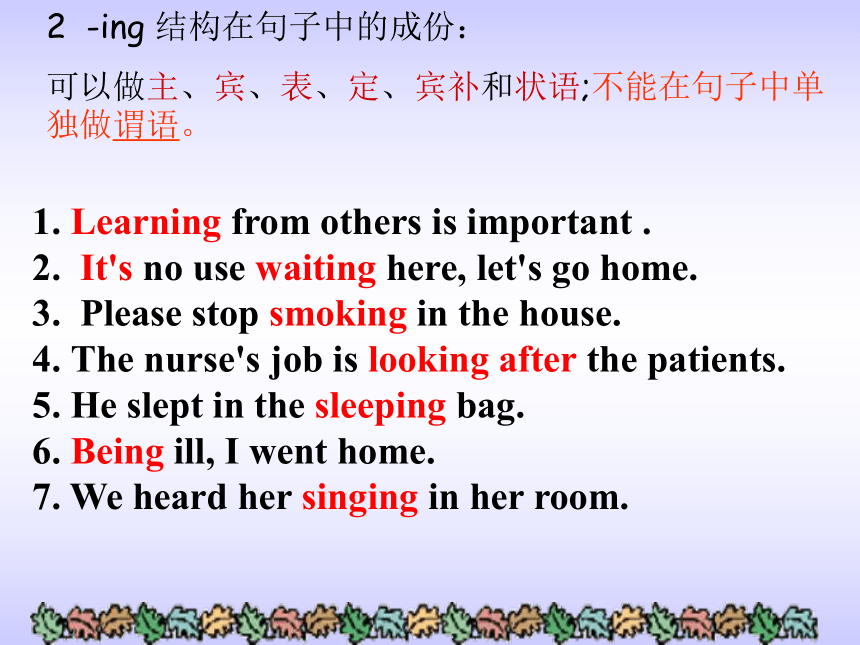
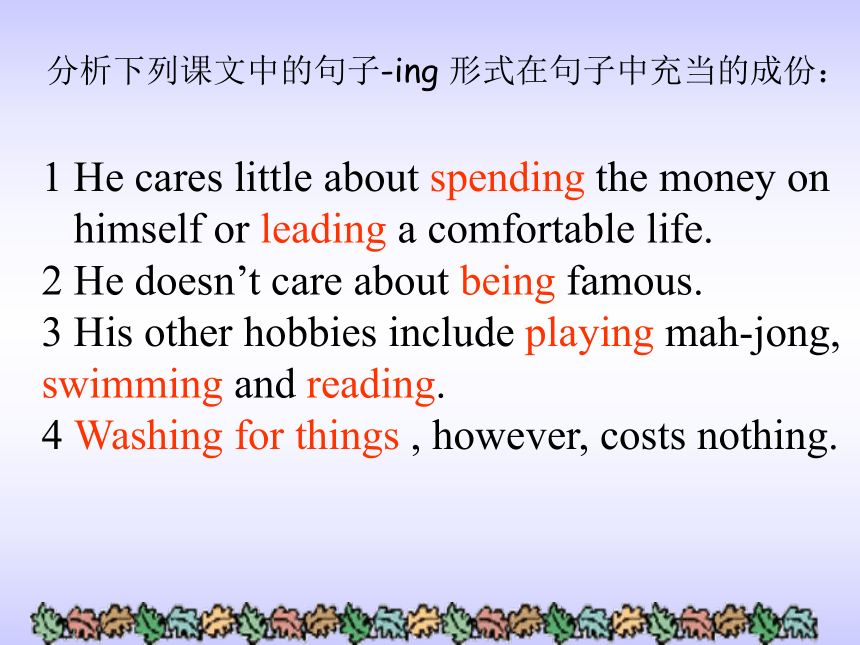

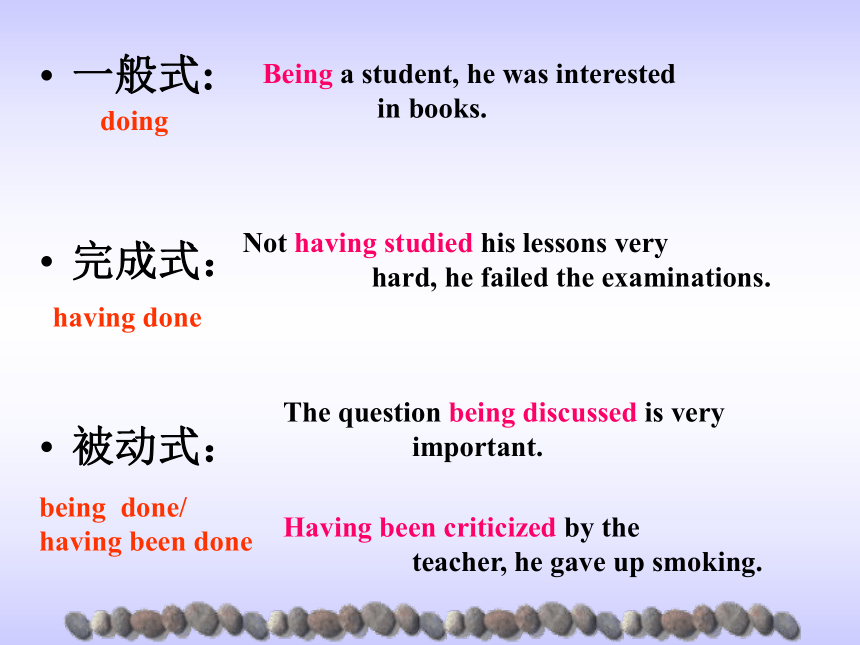
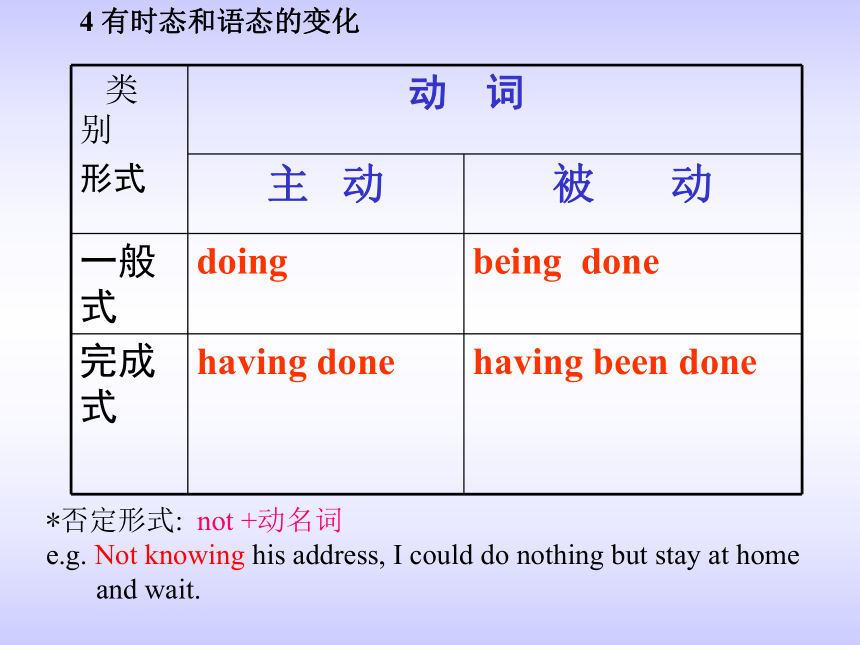
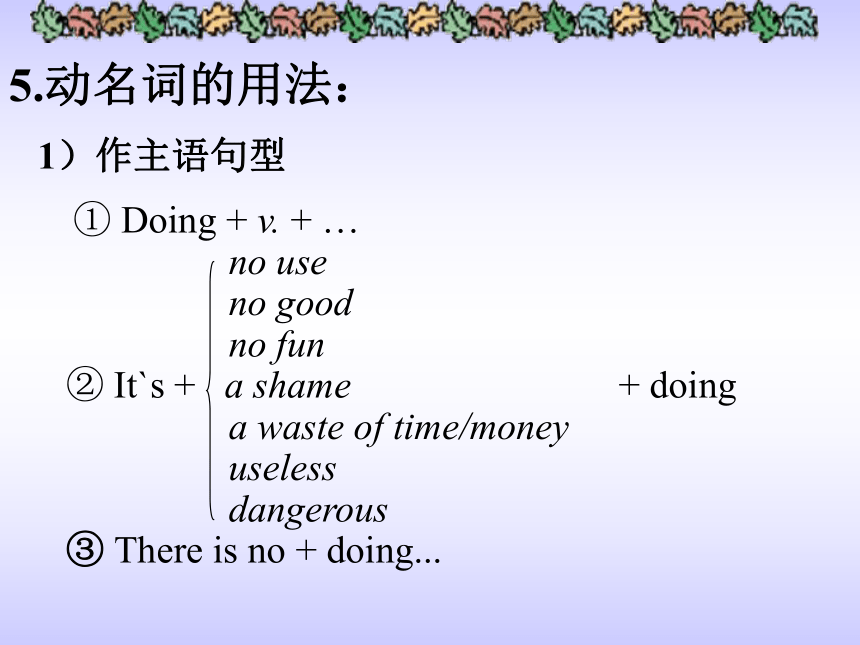
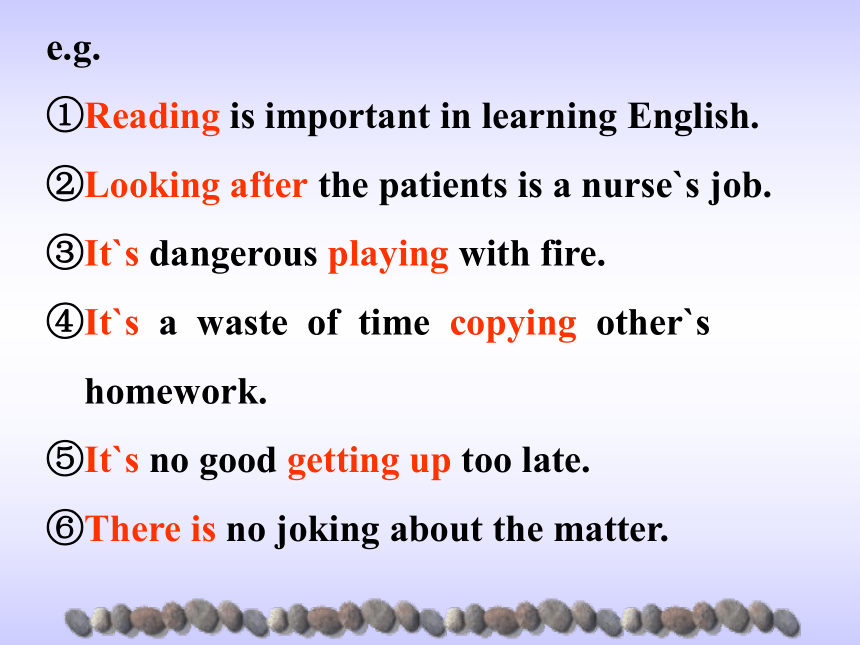
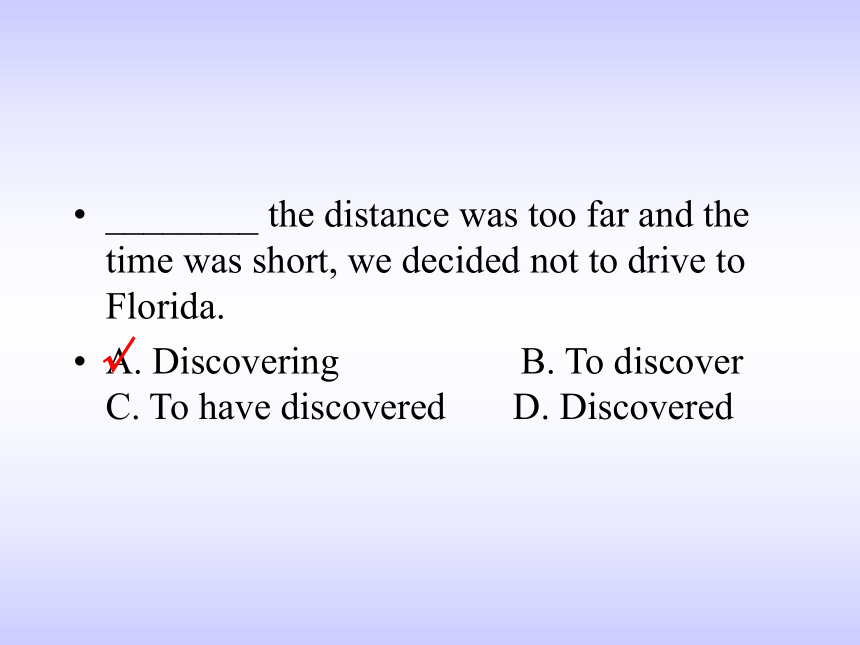
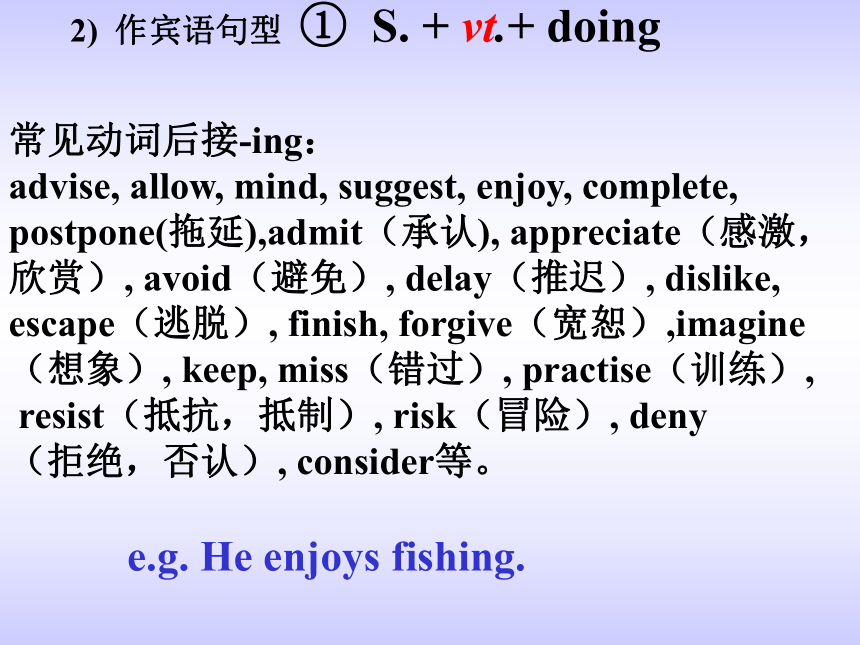

文档简介
课件65张PPT。Grammar Item
The –ing form as the subject and object1 -ing 分词的结构:v原形+ingreading / seeing / having / learning ---2 -ing 结构在句子中的成份:
可以做主、宾、表、定、宾补和状语;不能在句子中单独做谓语。
1. Learning from others is important .
2. ?It's no use waiting here, let's go home.
3. ?Please stop smoking in the house.
4. The nurse's job is looking after the patients.
5. He slept in the sleeping bag. ?
6. Being ill, I went home.
7. We heard her singing in her room.
分析下列课文中的句子-ing 形式在句子中充当的成份:1 He cares little about spending the money on
himself or leading a comfortable life.
2 He doesn’t care about being famous.
3 His other hobbies include playing mah-jong,
swimming and reading.
4 Washing for things , however, costs nothing.动名词在句中是名词的功能
(但保持有动词的特性)
e.g. I have no faith in both his sayings and
his doings.(名词性)
Smoking is a bad habit.(动词性)一般式:
完成式:
被动式:doing
having done
being done/
having been done
Being a student, he was interested
in books.
Not having studied his lessons very
hard, he failed the examinations.
The question being discussed is very
important.
Having been criticized by the
teacher, he gave up smoking. ?
4 有时态和语态的变化*否定形式: not +动名词
e.g. Not knowing his address, I could do nothing but stay at home
and wait.5.动名词的用法:
1)作主语句型
① Doing + v. + …
no use
no good
no fun
② It`s + a shame + doing
a waste of time/money
useless
dangerous
③ There is no + doing...e.g.
①Reading is important in learning English.
②Looking after the patients is a nurse`s job.
③It`s dangerous playing with fire.
④It`s a waste of time copying other`s
homework.
⑤It`s no good getting up too late.
⑥There is no joking about the matter.________ the distance was too far and the time was short, we decided not to drive to Florida.
A. Discovering B. To discover C. To have discovered D. Discovered√2) 作宾语句型 ① S. + vt.+ doing 常见动词后接-ing:
advise, allow, mind, suggest, enjoy, complete,
postpone(拖延),admit(承认), appreciate(感激,
欣赏), avoid(避免), delay(推迟), dislike,
escape(逃脱), finish, forgive(宽恕),imagine
(想象), keep, miss(错过), practise(训练),
resist(抵抗,抵制), risk(冒险), deny
(拒绝,否认), consider等。 e.g. He enjoys fishing.下列介词短语也用动名词做宾语:
devote oneself to, look forward to, object to(反对---), be (get) used to, prevent somebody from, insist on, persist in, give up, put off, set about(着手干---), pay attention to, can’t help, keep on, succeed in, feel like , be busy,the key to (---的关键),lead to(导致---)
e.g.
①She sat there without speaking.
②I look forward to seeing him again.
③Are you used to living there alone?
④When my father heard the news, he couldn`t help laughing.
⑤I don`t feel like going to see the film.
⑥He was busy preparing his lessons.改错
1.John succeeded to send pictures by electricity in 1925.
2.It’s no use to quarrel about it all day.
3.They delayed to take patient to the hospital.
4.I have to postpone to consider the matter till he comes.
5.The problem wants to discuss carefully.
6.Please excuse me to interrupt you.
7.They congratulated her on her inviting to the palace ball.
8.Have you got used to live on flour?
9.The young students are fond to sing popular songs.
10.She devoted herself to help homeless children.6 动名词的复合结构: one’s doing物主代词
人称代词宾格
名词所有格 +-ing分词
名词的普通格
在句子开头时必须用物主代词和名词所有格,通常在句中作主语和宾语。e.g. His coming made us very happy.?
? He was awakened by someone’s knocking
at the door.??————the meeting himself gave them a great deal of encouragement.
A . The president will attend
B. The president to attend
C. The president attended
D. The president’s attending
D7 下列动词 +动名词/不定式,意义明显不同(要求逐个记忆)
remember, forget, stop, mean, try, go on, regret, 例题:
In some parts of London, missing a bus
means _______for another hour.
Waiting B. to waiting
C. Wait D. to be waitingA8 下列动词+ 动名词/不定式,意义基本不变:
love, like, hate, begin,
start, continue; + to do / doing
sth. want,
require, need + to be done / doinge.g.
① The house needs repairing.
The house needs to be repaired.
The form needs _____ ink. A. filling in B. to fill in C. being filled in D. to be filled √③主动表被动 (观察一下句子中的名词和动词的关系)e.g.
① The room wants cleaning.
② The method needs improving.
③ This pair of shoes is past mending.
④ The problem is in need of working out.
⑤ The question is well worth discussing. ③主动表被动结构:
want (需要)
need (需要)
require (需要)
Sth. + stand (经受) + doing
bear (忍受)
be + past (超过)
be worth (值得)
be + in need of(需要)
need
Sth. + require 还可以+ to be done/doing
want
但注意: be worth ( + while) 只能 + doing
Sth. + be worthy of + n. / being done(动/动名)
Sth. + be worthy + to do / to be done(不定式)
e.g. ① The flowers needs watering.
The flowers needs to be watered.
The book is worth reading.
② The book is worthy of being read.
The book is worthy to be read.
①
②Like / hate / prefer I prefer walking to school every day.?? 我情愿每天步行去学校。 I prefer to stay at home today.?? 今天我情愿呆在家里。 -ing 表示抽象泛指,经常性,习惯性的动作.
to do 表示具体的,将来的, 一次性的动作. 动名词和动词不定式比较:e.g. I like swimming, but I don’t like to swim with you.?? ??????
我喜欢游泳,但我不喜欢和你一起游泳。The way you thought of __________ with the problem made very good sense. A. dealing B. having dealt
C. to deal D. how to deal√口语中,动名词置句首比不定式常见。
主语和表语应保持一致。
e.g. Seeing is believing.
To see is to believe.注意逻辑主语(是主动关系还是被动关系)
(see) from the hill, the park looked nice.
(see) from the hill, we found the park nice.SeenSeeing现在分词和过去分词的区别: 现在分词表主动/进行/伴随; 过去分词表被动/完成/状态-ing 分词做状语的用法Experts think that we need to eat meat because it contains vitamins(维生素) and minerals, _____ in vegetables.
not finding B. to not be found
C. finding D. not found
√现在分词和动名词的区别: 现在分词有逻辑上的主谓关系,动名词和名词间没有这种关系.e.g.
Sleeping car =A car for sleeping.
Sleeping baby=A baby that is sleeping.-ing 分词做定语:(用途)
(进行)Golden Gate Bridge in San Francisco
( 2.7 km, 1936 )GreeceThe Sea in HawaiiAloha!Lake Superior (one of the Great Lakes) zebra mussels
The Ecology Disaster in the Great Lakes P
A
R
I
SHe
who has never been to the Great Wall
is not a true man. the morning/afternoon/evening
the day/night
June
1999
June, 1999
three days in总结:一段时间,年份,月份和泛指的早午晚等用介词in。atnoon/night
two o’clock
11:30总结:具体的时刻和某些固定搭配前用介词at。Sunday
the 12th
Nov. 12th, 1999
Sunday morning
a cold morning of last winter on总结:星期、日期和具体的某一天及其早午晚用介词on。2. today,yesterday,tomorrow,the day before yesterday,the day after tomorrow这几个词或短语前也不需要介词。1. 由every,this/that,last/next 这几个词引导的时间状语前不需要搭配介词。 Eg. I saw an old man here last night.3. yesterday evening 昨天傍晚
last night 昨天夜里bored – boring
interested – interesting
relaxed – relaxing
tired – tiring ?!ed 表示自身感受
ing表示人或事物令他人感到…… I’m bored. 我很心烦。
He is a boring man./This book is boring. help sb. (to) do sth. 帮助某人做某事
help sb. with sth. 在某方面帮助某人
help oneself to … 请尽情享用/慢用…
can’t help doing sth. 忍不住做某事 I help my mother do housework on weekends.
My brother always helps me with my math.
Help yourself to some chicken, please.
We can’t help laughing when we hear a joke.want sth.
want to do sth.
want sb. to do sth. ask sb. (not) to do sth.
ask sb. about sth. hope to do sth.
hope (that) + 从句
注意: hope sb. to do sth. 这种用法不存在。 forget to do sth. 忘了去做某事
forget doing sth. 忘了做过某事 remember to do sth. 记得去做某事
remember doing sth. 记得做过某事 I’m sorry, teacher. I forget to bring my homework today.
You know that? Oh, I forgot telling you the news before. finish sth. 完成某事
finish doing sth. 完成做某事He finishes his lunch in ten minutes.I finished this book.
I finished reading this book.Who is Pierre Lambert?What is he doing there?How long is he staying?When is he leaving?Why is he going to ____ ?Where did he think about going?Where is he going?What is Pierre doing this summer?3a Isabella Romero, the famous movie star, is taking a vacation. She is going to Hawaii. “I just finished filming my last movie”, she says. “I’m too tired and I really need to relax myself.”
I asked her about her plans. “Well, I’m going swimming and scuba-diving. I’m also enjoying the seafood and Hawaiian hula. I want an exciting vacation!” 3bA Plan for Homestay Students This week, two students, Maggie from America and Tony form Britain, are coming to our school and they are spending the National Day Vacation with us. They have never been to China before and they need you to be their tour guide for a trip of three or four days in Beijing. Please plan carefully for the trip and we will find the best vacation plan for them. Where are you going on Oct. ___?
Why are you going ______?
When/what time are you going _____?
How are you going _______?
What are you doing _______?
How long are you staying _______?
(What time are you leaving?)
What and where are you eating? Suggest questions: We are going to Tian’anmen on the morning of Oct. 1, because Tian’anmen is the symbol of Beijing. We’re starting off at 8:30 and taking the subway. I am showing them around Tian’anmen Square and taking photos for them. We are staying there for three hours and then we are having lunch nearby. I am introducing Beijing Roasted Duck to them.Sample In the afternoon, we are visiting the Palace Museum. It is a group of great architects and they used to be offices and living rooms of past Chinese emperors. We are spending four hours there because it is really large. Then we are having supper in Wangfujing Street. There are a lot of delicious food from all over China.We’re coming back at 9:30. On Oct. 2, we are visiting the Summer Palace. Because they may be tired after the first day, so we’re going somewhere nearby. The Summer Palace was a villa used to spend the hot summers in Beijing. We’re … On Oct. 3, we are going to the Great Wall. It is one of the Seven Wonders in the world. Because it is in the suburb of Beijing, we have to set off very early, at about 5:45. We’re … For the last day, we are visiting the Temple of Heaven, because …
We’re ….Extensive wordsFragrant Hill Park 香山公园
Eight Sites Park 八大处公园
Botanical Garden 植物园
Grand View Garden 大观园
Great Bell Temple 大钟寺
CCTV Tower 中央电视塔
Confucian Temple 孔庙
Chinese Ethnic Culture Park 中华民族园Yonghe Lamasery 雍和宫
Ancient Observatory 古观象台
Temple of Reclining 卧佛寺
Rose Valley 玫瑰谷
Longqing Gorge 龙庆峡
Juyong Pass 居庸关
Temple of Azure Clouds 碧云寺
Lingjiu Buddist Temple 灵鹫禅寺一般将来时态的表示方法 will + 动词原形:
通常用于表示一般将来时。“will”前的主语可以是第一、二、三人称(当主语是第一人称时,也可以用第一人称+shall+动词原形来表示一般将来时)。will + 动词原形
这种将来意义常常带有说话人的主观态度和看法,有时既表示将来,也表示“预见”。The next train to Shanghai will leave at 9 p.m. You will feel better after having a good sleep We will /shall study hard this semester. will + 动词原形
有时既表示将来,也表示“意愿”(willingness)或“意图”(intention)。 I will get to school on time next time. I promise!They will go and see Sally as soon as they get to Beijing.She will clean her room if she invites her friends to her house.2. be going to+动词原形:也用于表示一般将来时。be going to可以表示“意图”。How long is he going to stay here?Are you going to visit Australia next summer holiday?2. be going to+动词原形:也用于表示一般将来时。be going to可以表示“预见”,即现在已有迹象表明将要发生或即将发生某种情况。 It’s already 7:30! I am going to be late for school today! Look at the black clouds in the sky. It is going to rain. “will + 动词原形”和“be going to+动词原形”都可以表示“意图”,因此有时可以互换使用。I won’t tell him about it.
? I am not going to tell him about it 但是,用be going to表示的“意图”通常时事先经过考虑的,而“will + 动词原形”所表示的“意图”,则是说话时刻临时想到的,因此在某些语境中,这两种结构又不可以交换使用。A: God! This box is terribly heavy!
B: I’ll help you to carry it.(这里不宜用am going to替换)A: Why are you all sitting here in this room?
B: We are going to have a meeting.(这里不宜用will替换)3. be+动词ing形式:
用现在进行时态表达将来意味,主要意义是表示按计划、安排即将发生的动作,常用于位置转移的动词,如go,come,leave,start,arrive等,也可用于其它动态动词。My mother is coming from Amoy to visit us this weekend.The plane is taking off at 10:55.以上说的“安排”是指“肯定的安排”,即说话时刻之前已经决定了的安排。这种用法通常带有表示将来的时间状语,如果不带时间状语,则根据上下文也可表示即将发生的动作。 A: Where are you going?
B: I’m going for a walk. Are you coming with me?
A: Yes, I’m just coming. Wait for me.
The –ing form as the subject and object1 -ing 分词的结构:v原形+ingreading / seeing / having / learning ---2 -ing 结构在句子中的成份:
可以做主、宾、表、定、宾补和状语;不能在句子中单独做谓语。
1. Learning from others is important .
2. ?It's no use waiting here, let's go home.
3. ?Please stop smoking in the house.
4. The nurse's job is looking after the patients.
5. He slept in the sleeping bag. ?
6. Being ill, I went home.
7. We heard her singing in her room.
分析下列课文中的句子-ing 形式在句子中充当的成份:1 He cares little about spending the money on
himself or leading a comfortable life.
2 He doesn’t care about being famous.
3 His other hobbies include playing mah-jong,
swimming and reading.
4 Washing for things , however, costs nothing.动名词在句中是名词的功能
(但保持有动词的特性)
e.g. I have no faith in both his sayings and
his doings.(名词性)
Smoking is a bad habit.(动词性)一般式:
完成式:
被动式:doing
having done
being done/
having been done
Being a student, he was interested
in books.
Not having studied his lessons very
hard, he failed the examinations.
The question being discussed is very
important.
Having been criticized by the
teacher, he gave up smoking. ?
4 有时态和语态的变化*否定形式: not +动名词
e.g. Not knowing his address, I could do nothing but stay at home
and wait.5.动名词的用法:
1)作主语句型
① Doing + v. + …
no use
no good
no fun
② It`s + a shame + doing
a waste of time/money
useless
dangerous
③ There is no + doing...e.g.
①Reading is important in learning English.
②Looking after the patients is a nurse`s job.
③It`s dangerous playing with fire.
④It`s a waste of time copying other`s
homework.
⑤It`s no good getting up too late.
⑥There is no joking about the matter.________ the distance was too far and the time was short, we decided not to drive to Florida.
A. Discovering B. To discover C. To have discovered D. Discovered√2) 作宾语句型 ① S. + vt.+ doing 常见动词后接-ing:
advise, allow, mind, suggest, enjoy, complete,
postpone(拖延),admit(承认), appreciate(感激,
欣赏), avoid(避免), delay(推迟), dislike,
escape(逃脱), finish, forgive(宽恕),imagine
(想象), keep, miss(错过), practise(训练),
resist(抵抗,抵制), risk(冒险), deny
(拒绝,否认), consider等。 e.g. He enjoys fishing.下列介词短语也用动名词做宾语:
devote oneself to, look forward to, object to(反对---), be (get) used to, prevent somebody from, insist on, persist in, give up, put off, set about(着手干---), pay attention to, can’t help, keep on, succeed in, feel like , be busy,the key to (---的关键),lead to(导致---)
e.g.
①She sat there without speaking.
②I look forward to seeing him again.
③Are you used to living there alone?
④When my father heard the news, he couldn`t help laughing.
⑤I don`t feel like going to see the film.
⑥He was busy preparing his lessons.改错
1.John succeeded to send pictures by electricity in 1925.
2.It’s no use to quarrel about it all day.
3.They delayed to take patient to the hospital.
4.I have to postpone to consider the matter till he comes.
5.The problem wants to discuss carefully.
6.Please excuse me to interrupt you.
7.They congratulated her on her inviting to the palace ball.
8.Have you got used to live on flour?
9.The young students are fond to sing popular songs.
10.She devoted herself to help homeless children.6 动名词的复合结构: one’s doing物主代词
人称代词宾格
名词所有格 +-ing分词
名词的普通格
在句子开头时必须用物主代词和名词所有格,通常在句中作主语和宾语。e.g. His coming made us very happy.?
? He was awakened by someone’s knocking
at the door.??————the meeting himself gave them a great deal of encouragement.
A . The president will attend
B. The president to attend
C. The president attended
D. The president’s attending
D7 下列动词 +动名词/不定式,意义明显不同(要求逐个记忆)
remember, forget, stop, mean, try, go on, regret, 例题:
In some parts of London, missing a bus
means _______for another hour.
Waiting B. to waiting
C. Wait D. to be waitingA8 下列动词+ 动名词/不定式,意义基本不变:
love, like, hate, begin,
start, continue; + to do / doing
sth. want,
require, need + to be done / doinge.g.
① The house needs repairing.
The house needs to be repaired.
The form needs _____ ink. A. filling in B. to fill in C. being filled in D. to be filled √③主动表被动 (观察一下句子中的名词和动词的关系)e.g.
① The room wants cleaning.
② The method needs improving.
③ This pair of shoes is past mending.
④ The problem is in need of working out.
⑤ The question is well worth discussing. ③主动表被动结构:
want (需要)
need (需要)
require (需要)
Sth. + stand (经受) + doing
bear (忍受)
be + past (超过)
be worth (值得)
be + in need of(需要)
need
Sth. + require 还可以+ to be done/doing
want
但注意: be worth ( + while) 只能 + doing
Sth. + be worthy of + n. / being done(动/动名)
Sth. + be worthy + to do / to be done(不定式)
e.g. ① The flowers needs watering.
The flowers needs to be watered.
The book is worth reading.
② The book is worthy of being read.
The book is worthy to be read.
①
②Like / hate / prefer I prefer walking to school every day.?? 我情愿每天步行去学校。 I prefer to stay at home today.?? 今天我情愿呆在家里。 -ing 表示抽象泛指,经常性,习惯性的动作.
to do 表示具体的,将来的, 一次性的动作. 动名词和动词不定式比较:e.g. I like swimming, but I don’t like to swim with you.?? ??????
我喜欢游泳,但我不喜欢和你一起游泳。The way you thought of __________ with the problem made very good sense. A. dealing B. having dealt
C. to deal D. how to deal√口语中,动名词置句首比不定式常见。
主语和表语应保持一致。
e.g. Seeing is believing.
To see is to believe.注意逻辑主语(是主动关系还是被动关系)
(see) from the hill, the park looked nice.
(see) from the hill, we found the park nice.SeenSeeing现在分词和过去分词的区别: 现在分词表主动/进行/伴随; 过去分词表被动/完成/状态-ing 分词做状语的用法Experts think that we need to eat meat because it contains vitamins(维生素) and minerals, _____ in vegetables.
not finding B. to not be found
C. finding D. not found
√现在分词和动名词的区别: 现在分词有逻辑上的主谓关系,动名词和名词间没有这种关系.e.g.
Sleeping car =A car for sleeping.
Sleeping baby=A baby that is sleeping.-ing 分词做定语:(用途)
(进行)Golden Gate Bridge in San Francisco
( 2.7 km, 1936 )GreeceThe Sea in HawaiiAloha!Lake Superior (one of the Great Lakes) zebra mussels
The Ecology Disaster in the Great Lakes P
A
R
I
SHe
who has never been to the Great Wall
is not a true man. the morning/afternoon/evening
the day/night
June
1999
June, 1999
three days in总结:一段时间,年份,月份和泛指的早午晚等用介词in。atnoon/night
two o’clock
11:30总结:具体的时刻和某些固定搭配前用介词at。Sunday
the 12th
Nov. 12th, 1999
Sunday morning
a cold morning of last winter on总结:星期、日期和具体的某一天及其早午晚用介词on。2. today,yesterday,tomorrow,the day before yesterday,the day after tomorrow这几个词或短语前也不需要介词。1. 由every,this/that,last/next 这几个词引导的时间状语前不需要搭配介词。 Eg. I saw an old man here last night.3. yesterday evening 昨天傍晚
last night 昨天夜里bored – boring
interested – interesting
relaxed – relaxing
tired – tiring ?!ed 表示自身感受
ing表示人或事物令他人感到…… I’m bored. 我很心烦。
He is a boring man./This book is boring. help sb. (to) do sth. 帮助某人做某事
help sb. with sth. 在某方面帮助某人
help oneself to … 请尽情享用/慢用…
can’t help doing sth. 忍不住做某事 I help my mother do housework on weekends.
My brother always helps me with my math.
Help yourself to some chicken, please.
We can’t help laughing when we hear a joke.want sth.
want to do sth.
want sb. to do sth. ask sb. (not) to do sth.
ask sb. about sth. hope to do sth.
hope (that) + 从句
注意: hope sb. to do sth. 这种用法不存在。 forget to do sth. 忘了去做某事
forget doing sth. 忘了做过某事 remember to do sth. 记得去做某事
remember doing sth. 记得做过某事 I’m sorry, teacher. I forget to bring my homework today.
You know that? Oh, I forgot telling you the news before. finish sth. 完成某事
finish doing sth. 完成做某事He finishes his lunch in ten minutes.I finished this book.
I finished reading this book.Who is Pierre Lambert?What is he doing there?How long is he staying?When is he leaving?Why is he going to ____ ?Where did he think about going?Where is he going?What is Pierre doing this summer?3a Isabella Romero, the famous movie star, is taking a vacation. She is going to Hawaii. “I just finished filming my last movie”, she says. “I’m too tired and I really need to relax myself.”
I asked her about her plans. “Well, I’m going swimming and scuba-diving. I’m also enjoying the seafood and Hawaiian hula. I want an exciting vacation!” 3bA Plan for Homestay Students This week, two students, Maggie from America and Tony form Britain, are coming to our school and they are spending the National Day Vacation with us. They have never been to China before and they need you to be their tour guide for a trip of three or four days in Beijing. Please plan carefully for the trip and we will find the best vacation plan for them. Where are you going on Oct. ___?
Why are you going ______?
When/what time are you going _____?
How are you going _______?
What are you doing _______?
How long are you staying _______?
(What time are you leaving?)
What and where are you eating? Suggest questions: We are going to Tian’anmen on the morning of Oct. 1, because Tian’anmen is the symbol of Beijing. We’re starting off at 8:30 and taking the subway. I am showing them around Tian’anmen Square and taking photos for them. We are staying there for three hours and then we are having lunch nearby. I am introducing Beijing Roasted Duck to them.Sample In the afternoon, we are visiting the Palace Museum. It is a group of great architects and they used to be offices and living rooms of past Chinese emperors. We are spending four hours there because it is really large. Then we are having supper in Wangfujing Street. There are a lot of delicious food from all over China.We’re coming back at 9:30. On Oct. 2, we are visiting the Summer Palace. Because they may be tired after the first day, so we’re going somewhere nearby. The Summer Palace was a villa used to spend the hot summers in Beijing. We’re … On Oct. 3, we are going to the Great Wall. It is one of the Seven Wonders in the world. Because it is in the suburb of Beijing, we have to set off very early, at about 5:45. We’re … For the last day, we are visiting the Temple of Heaven, because …
We’re ….Extensive wordsFragrant Hill Park 香山公园
Eight Sites Park 八大处公园
Botanical Garden 植物园
Grand View Garden 大观园
Great Bell Temple 大钟寺
CCTV Tower 中央电视塔
Confucian Temple 孔庙
Chinese Ethnic Culture Park 中华民族园Yonghe Lamasery 雍和宫
Ancient Observatory 古观象台
Temple of Reclining 卧佛寺
Rose Valley 玫瑰谷
Longqing Gorge 龙庆峡
Juyong Pass 居庸关
Temple of Azure Clouds 碧云寺
Lingjiu Buddist Temple 灵鹫禅寺一般将来时态的表示方法 will + 动词原形:
通常用于表示一般将来时。“will”前的主语可以是第一、二、三人称(当主语是第一人称时,也可以用第一人称+shall+动词原形来表示一般将来时)。will + 动词原形
这种将来意义常常带有说话人的主观态度和看法,有时既表示将来,也表示“预见”。The next train to Shanghai will leave at 9 p.m. You will feel better after having a good sleep We will /shall study hard this semester. will + 动词原形
有时既表示将来,也表示“意愿”(willingness)或“意图”(intention)。 I will get to school on time next time. I promise!They will go and see Sally as soon as they get to Beijing.She will clean her room if she invites her friends to her house.2. be going to+动词原形:也用于表示一般将来时。be going to可以表示“意图”。How long is he going to stay here?Are you going to visit Australia next summer holiday?2. be going to+动词原形:也用于表示一般将来时。be going to可以表示“预见”,即现在已有迹象表明将要发生或即将发生某种情况。 It’s already 7:30! I am going to be late for school today! Look at the black clouds in the sky. It is going to rain. “will + 动词原形”和“be going to+动词原形”都可以表示“意图”,因此有时可以互换使用。I won’t tell him about it.
? I am not going to tell him about it 但是,用be going to表示的“意图”通常时事先经过考虑的,而“will + 动词原形”所表示的“意图”,则是说话时刻临时想到的,因此在某些语境中,这两种结构又不可以交换使用。A: God! This box is terribly heavy!
B: I’ll help you to carry it.(这里不宜用am going to替换)A: Why are you all sitting here in this room?
B: We are going to have a meeting.(这里不宜用will替换)3. be+动词ing形式:
用现在进行时态表达将来意味,主要意义是表示按计划、安排即将发生的动作,常用于位置转移的动词,如go,come,leave,start,arrive等,也可用于其它动态动词。My mother is coming from Amoy to visit us this weekend.The plane is taking off at 10:55.以上说的“安排”是指“肯定的安排”,即说话时刻之前已经决定了的安排。这种用法通常带有表示将来的时间状语,如果不带时间状语,则根据上下文也可表示即将发生的动作。 A: Where are you going?
B: I’m going for a walk. Are you coming with me?
A: Yes, I’m just coming. Wait for me.
